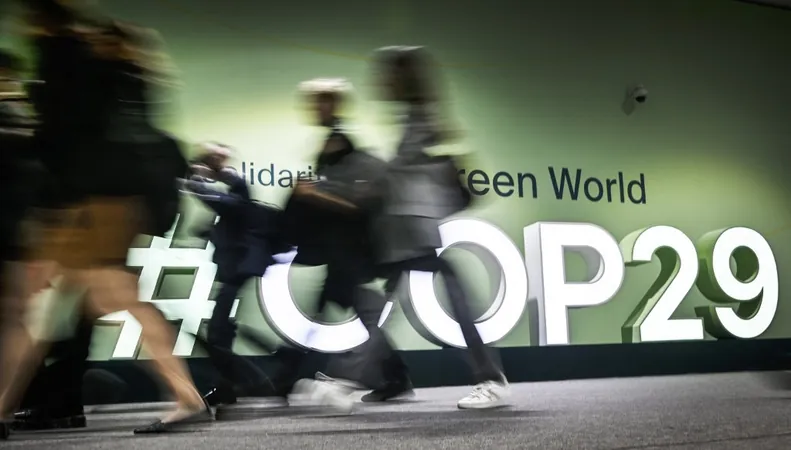
COP29: Urgent Insights on Climate Change Science as Global Tensions Rise!
2024-11-12
Author: Arjun
As the U.N. climate summit COP29 takes center stage amidst yet another year of record-breaking global temperatures, the urgency to address climate change has never been clearer. The pressure on negotiators has soared as the latest scientific findings unveil alarming trends regarding our planet's health.
Are We Already Over the 1.5°C Threshold?
New research indicates that we may have already breached the critical 1.5-degree Celsius threshold—an alarming sign that could result in irreversible climate impacts. This conclusion emerges from a recent study analyzing atmospheric gases captured in Antarctic ice cores, covering a vast timeline from 2,000 years ago. While conventional assessments compare current temperatures to a baseline from 1850-1900, this fresh analysis employs an even longer historical lens, suggesting the world has warmed closer to 1.3°C to 1.5°C. Experts warn that 2024 is likely to mark the hottest year on record.
Unleashing Supercharged Hurricanes
The oceans are playing a significant role in enhancing the intensity of hurricanes. As ocean temperatures rise, storms not only intensify but do so at an unprecedented speed, shifting from Category 1 to Category 3 in mere hours. For instance, Hurricane Milton transformed rapidly in the Gulf of Mexico, wreaking havoc along Florida's coastline. With warmer air holding more moisture, these storms are also causing unprecedented flooding, affecting regions traditionally unaccustomed to such deluges, like Asheville, North Carolina, after Hurricane Helene.
The Deadly Toll of Wildfires
Global warming is creating parched conditions across forests and waterways, resulting in gargantuan wildfires across diverse regions—from the western United States and Canada to Southern Europe and parts of Russia. A chilling new study highlights that close to 12,000 deaths in the 2010s were tied to the detrimental effects of wildfire smoke exacerbated by climate change. As ecosystems suffer, the health hazards from smoke episodes increase significantly.
The Coral Crisis Worsens
The world’s coral reefs are undergoing a catastrophic event as the current mass coral bleaching episode marks the largest on record. Scientists fear we may have crossed a crucial point for recovery, with ongoing research necessary to monitor the reefs across the globe for potential signs of rehabilitation as temperatures fluctuate.
Alarm Bells from the Amazon
The Amazon rainforest is experiencing its most severe drought since 1950, with river levels dropping to historic lows and fires devastating its vast expanse. This dire situation aligns with studies predicting that by 2050, between 10% and 47% of the Amazon may face a lethal combination of heat and drought due to climate change. Such changes could push the rainforest past a tipping point, turning it into degraded landscapes unable to sustain its own ecosystem.
Global Forests Under Stress
Data indicates that global forests are struggling to sequester carbon dioxide as effectively as they have in previous years. Factors like the Amazon’s drought and rampant wildfires have contributed to a record increase in atmospheric CO2 levels.
A Volcanic Wake-Up Call
Strikingly, climate change could also potentially heighten volcanic activities. In regions like Iceland, scientists observe that retreating glaciers reduce pressure on the Earth’s crust, potentially destabilizing underground magma reservoirs. Researchers remain vigilant, as around 245 volcanoes worldwide, located beneath or near ice, face similar risks.
The Atlantic at a Crossroads
Furthermore, the warming Atlantic could jeopardize pivotal ocean current systems. The Atlantic Meridional Overturning Circulation (AMOC), known for moderating European winters, has weakened alarmingly—studies show a 15% drop since 1950. Current research suggests it may be nearing a critical slowdown, heightening global climate concerns.
As COP29 unfolds, the interplay of these extraordinary scientific findings with political negotiations will be instrumental in shaping our collective response to the impending climate crisis. Will this summit be the turning point our planet desperately needs? Stay tuned!




 Brasil (PT)
Brasil (PT)
 Canada (EN)
Canada (EN)
 Chile (ES)
Chile (ES)
 España (ES)
España (ES)
 France (FR)
France (FR)
 Hong Kong (EN)
Hong Kong (EN)
 Italia (IT)
Italia (IT)
 日本 (JA)
日本 (JA)
 Magyarország (HU)
Magyarország (HU)
 Norge (NO)
Norge (NO)
 Polska (PL)
Polska (PL)
 Schweiz (DE)
Schweiz (DE)
 Singapore (EN)
Singapore (EN)
 Sverige (SV)
Sverige (SV)
 Suomi (FI)
Suomi (FI)
 Türkiye (TR)
Türkiye (TR)